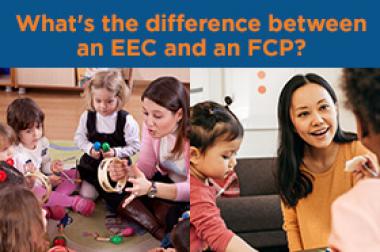
Ours is a diverse community and families have diverse childcare needs.
Fortunately, Central Massachusetts parents can choose from an array of high-quality, developmentally appropriate childcare programs across two broad categories:
- Early education and care centers (EECs)
- Family childcare providers (FCPs)
EECs and FCPs have something for everyone, from small group settings in neighborhood homes to larger groups hosted by nonprofit organizations.
What’s the difference between an early education and care program and a family childcare provider?
Early education and care, or EEC, refers to programs offered in childcare centers operated by nonprofit and for-profit organizations. Local examples include the Guild of St. Agnes, Worcester Comprehensive Education & Care, and Head Start and Early Head Start offered by the Worcester Community Action Council.
Family childcare providers, or FCPs, on the other hand, operate out of their own homes. Unlike EEC programs, attendance is capped at six children.
EEC programs and family child care providers and educators are each state-licensed by the Massachusetts Department of Early Education and Care, with stringent requirements for programs and educators alike.
Many Worcester-area early educators have also been trained and mentored by Edward Street and our partners in the community. Project Flourish, for example, operates apprenticeship programs for both EEC educators and FCP staff.
To learn more about childcare choices, contact Seven Hills.
FCPs provide trusted, convenient options that support diversity
Weekday mornings can be challenging. Parents and caregivers have to get the whole family, including themselves, ready for the day, then drive children to childcare and get to work on time.
That’s where family childcare providers come in.
Situated in neighborhood homes, they give families a trusted local option. Also, many FCPs have more flexible drop-off and pick-up hours for parents who work early in the morning or late in the evening. But FCPs offer more than neighborhood convenience. Capped at six children, they’re a good option for young children who respond well to smaller group sizes in home environments.
Moreover, FCPs offer linguistic and cultural matches for bilingual families (and any family wishing to give children the benefits of early bilingualism).


EEC programs broaden socialization as children grow
Many families enroll in an FCP initially and then transition to an EEC program when children reach three or four years of age. As children grow up they may be ready for larger group settings. The increased socialization can help prepare them for kindergarten and elementary school.
The larger size of EEC programs also has the benefit of more available staff. While FCPs may occasionally close for a day, due to situations like educator illness, EEC programs are rarely forced to close.


Despite these choices, childcare deserts are impacting families across Worcester and MA
Did you know that 51% of Massachusetts residents live in childcare deserts?
Here in the Worcester area, many families struggle to access childcare. There simply aren’t enough spaces in enough locations, and high tuition creates an additional barrier to entry.
Fortunately, legislators and business leaders are rallying around accessible childcare for all.
“The strength of Massachusetts is its families. And they sorely need our help,” Governor Maura Healey declared in her inaugural address. “Our state has some of the highest child care costs in the country. Our care workers don’t make a livable wage. So today, let us pledge to be the first state to solve the child care crisis.
In a recent conversation with Edward Street, State Senator Robyn Kennedy called childcare “a silver bullet for the whole community.”
“Every child should have equitable access to this academic start,” Kennedy said. “Early education and care also ensures that parents and caretakers can participate in the workplace and businesses can have the workforce they need to thrive.”
Senator Elizabeth Warren has made childcare legislation a key part of her reelection campaign, in part due to her own experiences. She told Time magazine she was unable to afford childcare as a young mother. Without the help of a family member, she couldn’t have continued her career in law, which eventually led to her role in the U.S. Senate.
The Massachusetts Business Roundtable and the Massachusetts Taxpayers Foundation agree: childcare access and affordability issues are a significant cause of workforce shortages that affect businesses and the economy.
The Massachusetts State Legislature, meanwhile, is considering a pair of bills that would increase access to high-quality childcare—with economic benefits for all.
Families, businesses, and community leaders get it: childcare raises children and the whole community. Join Edward Street and the Common Start Coalition in calling on State Legislators to co-sponsor bills HD. 2794 and SD. 667.
To learn more about childcare choices, contact Seven Hills.
